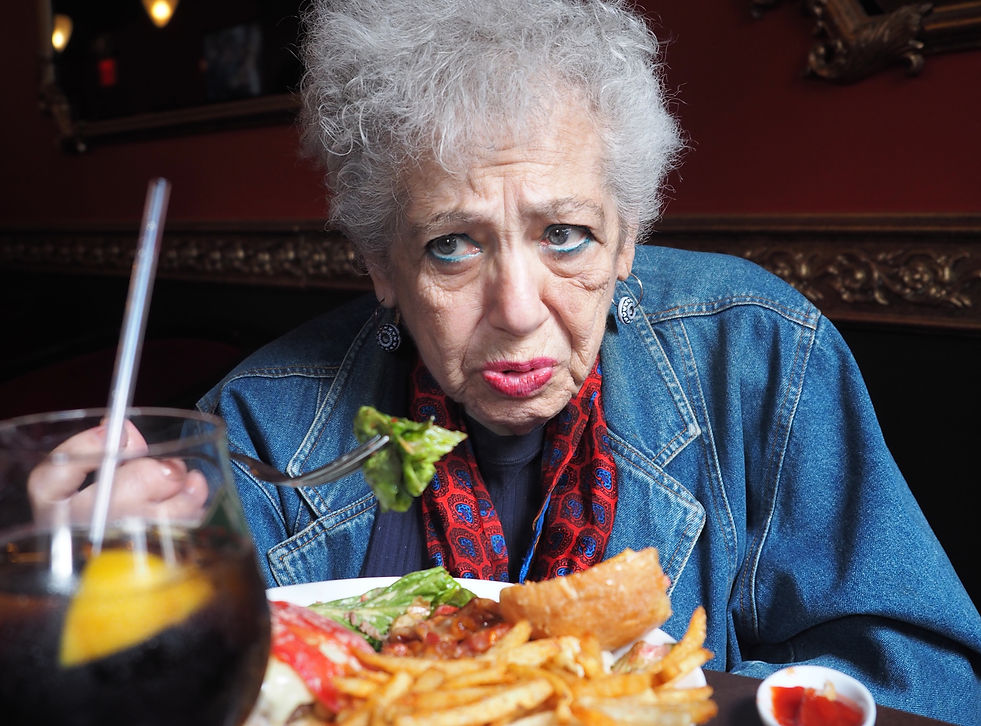One year. One city. 20 lives.

Cyrille Romer
January 6, 1931 - March 31, 2016
We met Cyrille Romer, as a part of Exceeding Expectations, at the beginning of 2015, just after she had moved into an assisted living facility on the Upper East Side of Manhattan.
Despite the many challenges she had faced through out her life, including her husband’s suicide and her own health struggles, we followed her as she put on a smile, scarf and make up every morning while adapting to a new living environment. Furthermore, she always found the motivation and inspiration to keep painting. In February of this year, we published her story, which was soon after picked up by two magazines with wide circulation. Thousands of people were inspired by her story, many letting us know how much Cyrille’s story had touched them.
Unfortunately, in the beginning of March, Cyrille fell on her way to dinner, resulting in a hip fracture. She underwent surgery and was admitted to a rehabilitation facility to get on her feet again. During her stay there, she developed respiratory complications. On March 31, Cyrille passed away.
In April, Cyrille was buried in a mausoleum where her husband had been buried decades earlier. Friends and family flew in from around the country to attend the funeral.
At the funeral, Cyrille’s daughter Alexis spoke about her mother’s overwhelming positivity:
“She was a ray of sunshine always looking at life with rose colored glasses and unlimited optimism. We always laugh at how she would come into our room each morning, open the curtains and say “rise and shine”! Growing up with that was, at times, a bit hard for us to take, especially as teenagers. While we hated it at the time I’d give my eye teeth right now to hear it again,” she said.
“We already miss her dearly but know that she and Dad are finally together again…having a glass of wine listening to the Bossa Nova and reminiscing about what a beautiful life they had and how lucky Mom was to live to see 85.”
We are immensely grateful to Cyrille for sharing her life story with us. We feel inspired by her positivity and perseverance to do what she loved.
We will miss her.

Story by: Dorian Block & Heather Clayton Colangelo
Photography by: Heather Clayton Colangelo & Myra Iqbal
That Seat is Taken
It was the first week of January 2015 and one of Cyrille Romer’s first days living at the Carnegie East House, an assisted living facility located in the middle of the ongoing Second Avenue subway construction on the Upper East Side of Manhattan.
Cyrille put on her teal eye liner and bright lipstick as she has daily for years and went to the building’s dining room to eat.
She chose a chair to sit in. The people already at the table told her no, she couldn’t sit, the seat was taken. So she tried another. Within moments a woman approached her, livid.
“That’s my chair! I’ve been sitting in that chair for two years,” the woman yelled.
Cyrille had been through so much turmoil – over the course of her life-- and recently. She is a two-time breast cancer survivor. Her husband, a Holocaust survivor, committed suicide after losing his job, and she was the one to find him dead.
A decade after her husband’s death, Cyrille was hit by a car which broke her ribs, shoulder, pelvis, nose and finger, and she has been recovering from the accident ever since.
In recent years, she is living with leukemia, heart failure and spinal stenosis.
Until the end of 2014, Cyrille lived independently on East 86th St., within walking distance of two of her three daughters. She ran her errands in stores where people knew her, hosted friends in her apartment, and she regularly went to the 92nd Street Y for their daily senior program, which included music, lectures and art classes, Cyrille’s passion.
By the end of the year, she had depleted her financial resources and was living on social security that did not cover the cost of her rising rent. Her daughters supported her. She was walking more slowly and unsteadily, and then she landed in the hospital and rehab with a swollen leg and heart trouble.
Her daughters, concerned about her safety, health and ability to live alone, had contacted a referral service called A Place for Mom and looked at a few assisted living facilities, despite the high price tags. They, and Cyrille, liked that the Carnegie East House was so close to the neighborhood Cyrille was used to, to the 92nd Street Y and to them. An apartment opened up while Cyrille was in rehab and her daughters moved her in.
Just out of rehab and adjusting to her new home, Cyrille tried not to be hurt by the reaction she received in the dining room.
She moved on from where the woman had been “sitting for two years,” and she tried another table, looking for cues until she could find an appropriate place to sit. It became a process at meal after meal to follow.
“You don’t know what it’s going to be like here,” Cyrille said. “You can’t expect at a place like this for everything to be perfect, and you have to accept the areas that are not up to what you thought they would be.”
“And,” she added “You’ve never lived with crotchety 90 year olds before.”
 | 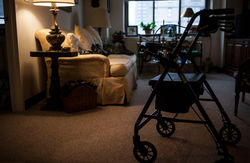 |  |
|---|---|---|
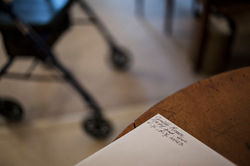 |  |
Through all of the challenges she has faced, what has kept Cyrille going are her daughters, who she speaks to daily, and her painting, which she calls a “godsend.”
Her apartment walls are decorated with her work - a large still life of pears on a table, a portrait of an Egyptian man in a turban, and her favorite, a more simplistic painting of a bridge in Central Park that she walked by and committed to memory to paint later.
Art books line her shelves. Her apartment’s décor itself is a work of art – splashes of bright green on the seats of her dining chairs and carefully chosen fabrics on her living room upholstery. Her wardrobe, too, is full of style, including a large collection of scarves and jewelry that she uses to compose outfits everyday.
And, everyday, no matter what is happening or how she feels, Cyrille maintains the discipline and love of paint. She sits at her desk, puts on her reading glasses, and she paints the covers of greeting cards. They are just a manageable enough size that she can do them at her desk and she can finish one in a little over an hour. She has built a small business over the years selling them to friends, family and several gift shops, including one in Quebec, Canada that has been ordering from her for 20 years.
On the cards, Cyrille paints flowers and vases and birds. Happy, colorful things. Her signature “Cyrille” is prominently on the bottom of each one.
“People need a love other than people,” she says. “I am so grateful to have something to do that I love.”
When Cyrille paints, she says she is so focused on what color to choose and what stroke to make that her mind doesn’t have space to wander.
 |  |  |
|---|---|---|
 |  |  |
A few months after moving into assisted living, Cyrille still can’t locate certain things that her daughters unpacked (spices, her shoes for an upcoming wedding), and she misses being able to bake a cake and invite people over.
But mostly she is happy. She attends activities, usually multiple ones, every day. She is not limited by the weather outside, as she used to be, because she doesn’t have to travel. She has started therapy for her hip in the building. She loves the food. She loves Friday evening “cocktail hour,” a piano hour sans alcohol. Someone does her laundry every Tuesday. The staff know her and seem to care. She uses Access-a-Ride, the city’s paratransit system, as well as taxis the system reimburses, to take her to doctor’s appointments and, not as often as she’d like, to the 92nd Street Y art classes and to concerts around Manhattan.
“Getting older, life is more difficult. Here is the best thing that could have happened. The main thing is that the children don’t have to worry. There is always someone here to solve a problem, and they do.”
Still, socially, despite participating in many activities, Cyrille, an outgoing, open person, is frustrated that she has made little progress when it comes to making friends. Her fellow residents – who she defines as mostly women like her who spent most of their lives at home - do not visit each other’s apartments. They interact only during the organized meals and activities, which Cyrille feels makes it harder to develop intimacy.
Cyrille went to the building’s “Talk it Out” group to raise the issue of people demanding to sit in the same seats and tables in the dining room. She said she made the case about how this attitude both prevents people from meeting each other and creates an unwelcoming environment. She said others agreed with her, but no progress has been made.
“The conclusion was they were going to try to concoct a game where you change seats, but that hasn’t happened.”
Cyrille has also found that it is hard socially when everyone in the building is dealing with their own history of loss and health struggles, particularly hearing impairments.
“By the time you get here, you have many friends, I mean friends of longstanding and knowing each other. These are new acquaintances and since half the time they don’t know what you’re saying or I can’t hear them, it’s difficult.”
She said it has also been hard to judge how the person in front of her is processing.
“You ask them a question. You’ll talk about it for a little bit. Then that person will repeat exactly what they just said,” she said. “It’s phenomenal…I look at them like ‘God…”
Another example: “I’m standing at the elevator. A women comes over and says ‘you took my walker.’ I said, ‘look it’s mine. it’s not yours’ She went over to the next woman and said ‘you took my walker.’ I couldn’t believe it.”
And yet, she is not too proud or unrealistic to know that this could not be her.
“When I got here I thought everybody is so old and of course I realized that I’m just as old,” she said. “I know one day it could be me.”
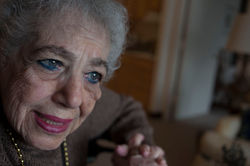 |  |  |
|---|---|---|
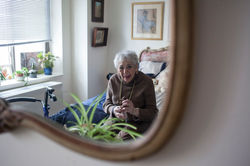 |
Cyrille grew up in a large, corner house in Borough Park, Brooklyn, in what she describes as an idyllic street with mature trees and families from around the world.
Her next door neighbors on one side were Italian. On the other side, they were Syrian. Cyrille’s family was Jewish, from Eastern Europe.
Her father worked at the family’s business which rented voting machines to unions for their elections. Cyrille’s mother was an interior decorator.
As a child and teenager, Cyrille wanted to be an actress and took weekly acting lessons at Carnegie Hall. At the end of high school, she met her husband Marian on a blind date. Marian came to the U.S. from Poland through a scholarship from a national Jewish organization. He had survived the Holocaust, but he had lost much of his family, including his father, who died hiding in a closet. Those who survived were separated amongst distant countries that would accept them – Venezuela, France, Australia, the U.S.
Cyrille was attracted to Marian’s blue eyes, sophistication and charm.
They got married when she was 21 and he, 23. Their marriage, as was common at the time, ended her dreams of acting and her college career (she was halfway through to a degree from Adelphi University).
Cyrille and Marian lived and raised their children in several suburbs of Philadelphia and then in New Jersey, moving as Marian, a textile engineer, who designed the machines that manufactured fabrics, worked for several companies. As a part of his work, Marian had opportunities to travel to many different countries and Cyrille, and sometimes their three daughters – Michelle, Dorian and Alexis - came along.
As her kids got older, Cyrille wanted to do something creative, so she took painting classes offered by a local Parent Teacher Association. Her love of painting grew, and she never stopped.
In 1989, when her children were all newly out of the house, the company her husband worked for fell apart and he lost his job.
A few months later Marian killed himself. It is a weight Cyrille carries with her constantly.
“At the time I thought it hurt that he didn’t have enough faith in me to help him through this. Let’s work it out together. I couldn’t understand,” she said. “Now I think about what he went through (in the Holocaust) and it’s torturing.”
Marian had thought his family would be better off financially after he died by benefitting from a life insurance policy he had purchased. The policy was not valid in the case of suicide.
Cyrille was forced into the working world, after living through adulthood having never been employed. She worked as a customer service representative for an insurance company for a decade, until her car accident. Those years of working provide Cyrille with the $1,200 in social security that she receives today.
Following the car accident, Cyrille moved to New York City to heal, to be close to her daughters and to have access to the city.
Fifteen years later, even though it is much more challenging to get around, she says that New York City is her favorite place that she has lived.
 |  |  |
|---|---|---|
 |
By summer, Cyrille is deep into the routine of Carnegie East.
One a day in July, she wakes up at 6:30 a.m. to give herself plenty of time to get ready before breakfast.
“I find that lately, since I’m here, I’m slower. I’ll think about the day. Before I know it, half an hour has gone by and then I rush. The first thing I do is take Tylenol and then a shower. Then I do my hair and make up.”
She picks out her outfit: white slacks, a teal top, a beaded necklace, rings, a watch, dangly earrings, a diamond and gold necklace and puts her keys around her wrist. (“I always get an awful lot of compliments on what I wear and how I look,” she says. “It makes you feel good.”)
At about 8:15 a.m. she goes to the dining room for a breakfast of an English muffin, oatmeal topped with bananas and coffee. She does keep cereal, fruit and milk in her apartment but she likes the potential of interacting with people downstairs.
After breakfast, she returns to her room, makes her bed, puts things away and takes her medications. She turns on the TV for company although she doesn’t really watch (“I always love voices,” she says.). And she uses her computer to check her email and play solitaire.
Afterwards, it is time for Word Activity Class – one of Cyrille’s favorites.
The instructor is Anita, who used to work at Carnegie East, but likes being there so much, she has returned to volunteer.
Today, she writes a word on the board: ECHINODERMATOUS. The goal of the class is for everyone to pick out as many smaller words as possible by rearranging the letters within it.
Cyrille comes up with many fairly complex words well after several fall out or repeat words already there. “Enormous” “Stomach” “Trader” “Moisture” “Hinder” “Drain” “Nicer” “Niece” are her victories.
Anita associates the words people call out with their meaning. “I had my NAILS done yesterday,” she says, or “TURID, do you know what that means?”
Cyrille loves the class and says it helps keep her mind sharp.
“All of the sudden words keep popping up. I had a million words. I loved it. That’s why I keep coming back.”
Cyrille says she plays this same game often when trying to fall asleep.
 |  |  |
|---|---|---|
 |  |  |
 |  |  |
After lunch, it is a special afternoon at Carnegie East, because the building’s theatrical group puts on a musical comedy that they co-created with the activities director over several months.
“Carnegie Hall,” the facility’s large activity room has been turned into the “S.S. Carnegie.”
The show is about a cruise ship that gets stuck in North Korea, with Cyrille’s neighbors playing different members of the cruise ship’s crew. It includes racy jokes and ends in a wedding between Kim Jong-un and Dennis Rodman.
The cast is dressed in costumes, reads lines and sings songs from binders. They are enthusiastic, serious and proud of the show. There is tea and cookies in the library and back terrace afterward to celebrate their work.
Cyrille sits alone on the terrace. Cyrille says that afternoons at Carnegie East can be a lonely time, when she thinks of her family and people she misses.
Afterward, at dinner, she sits with three others: Edith, Barbara and Norm.
They briefly talk about Helen who recently died and another resident who they haven’t seen recently.
“Anyone hear how Ruth is doing?” one of the ladies ask.
Cyrille tells them that Ruth is in rehab.
The talk turns to children and if it’s more difficult to raise boys or girls. They talk about names and newly popular baby names. They talk about middle names (Edith and Cyrille do not have them) and nicknames (Cyrille discloses how children in school called her “Cereal.” “I hated it!” she says.)
Talk turns to how everyone came to arrive at Carnegie East. Norm moved in five years ago, and has since left and returned following heart valve surgery.
Barbara lived in Kips Bay, and said she is still adjusting: “It takes awhile. Family helps. Getting out helps.” She said that she is struck that society just doesn’t “know what to do with us.”
Edith says she does not want to talk much about her former life. She used to live in Brooklyn near the Botanical Gardens (“a beautiful, great place”) “It was a good world. I’m here now. It is what it is.”
When asked about how they feel about their social connections at Carnegie East, they, too, feel lonely like Cyrille, despite being surrounded by people.
“It’s awful when people you live with, they are your neighbors and you don’t know who they are,” says Barbara. “I don’t know my neighbors. It’s awful.”
“I don’t know anybody here,” chimes in Edith.
Cyrille turns toward Edith and asks: “Do you know my name?”
Edith admits she does not. She challenges Cyrille to see if she knows hers.
Cyrille does. “Edith,” she says.
Instead of being embarrassed, Edith is thrilled. “Somebody here knows me!” she says.
Halfway through Cyrille’s chicken course, conversation turns to loss, as it often does, and Cyrille largely remains quiet.
Barbara talks about being a widow and overwhelming loneliness.
“This is what you come up against when you get older,” she says. “Would you like to have a boy toy?” she asks Edith and Cyrille.
They laugh.
“You just don’t want to be lonely,” Barbara says.
Cyrille says privately that she remains vague when people talk about loss, feeling alone in a room of people who have also lost most of the people who they have ever known.
“Everybody here is going through it. Friends have lost two husbands and children. Still with suicide, people never understand. How do they understand? I don’t understand.”
At the end of dinner, Barbara jokes: “The older I get the less I know.”
Cyrille says, “Me too.”
 |  |  |
|---|---|---|
 |  |  |
 |
After dinner, Cyrille watches the changing sky outside her large window overlooking a neighboring building’s waterfall and the traffic of Second Ave.
“I do love it. I love sitting here after dinner as the sun goes down. There’s a gorgeous view,” she says. “It’s home.”
Cyrille says that while she enjoys her days (and is particularly grateful that she has lived to know and love her now 6-year-old great-granddaughter), she also does not hope to live many more years. When she sees one of her neighbors who is 99 years old, she does not want to be like her.
“It’s enough already. I don’t like interfering in my children’s lives. I don’t like to accept their assistance,” she said. “Being alive is expensive.”
“I’ve lived a long time. There’s a lot I’ve been aware of. I’ve done a lot of travel. I love going to the theater. The thought of it now is so difficult. I’ve given up,” she says.
At the end of the day, Cyrille prepares to sleep, and she finds humor in what her body has come to.
“I put my walker away. I take my hearing aid out. I take my prosthesis off. I take my teeth out,” she says. “It’s pretty funny.”
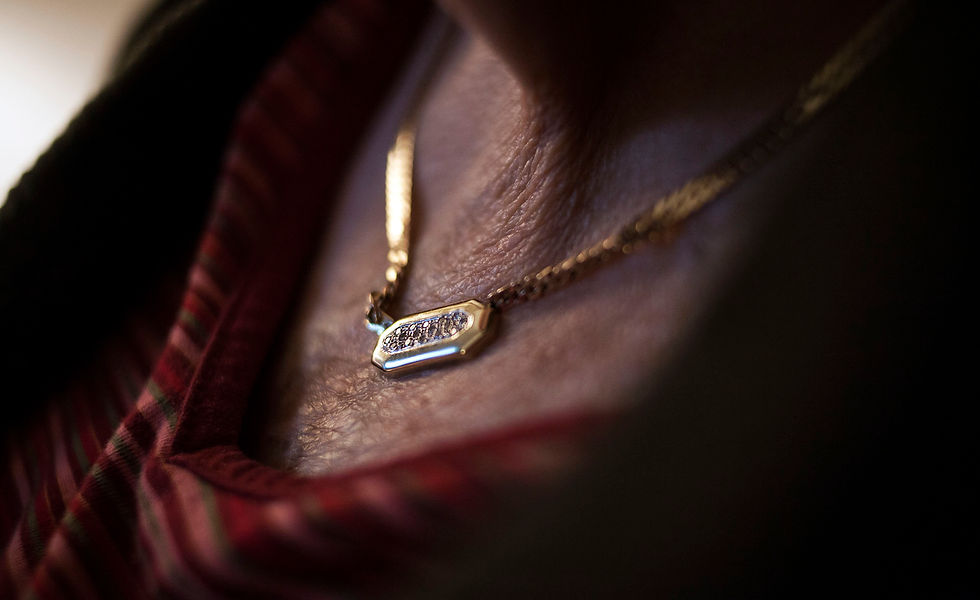
On a fall day, jazz pianist and singer Barbara Carroll sits at the piano in the center of the sanctuary of Saint Peter’s Church on Lexington Avenue.
A bright turquoise head wrap decorates her head.
She is 90-years-old. A crowd of over 100 fill the sanctuary. The audience is a mix of older people with canes and walkers pushed to the sides of the aisles, and suited professionals presumably on their lunch breaks. The air-conditioning provides a respite from the steamy 90-degree weather just outside.
The Midday Jazz program was founded by the late Edmund Anderson (a personal friend and lyricist to Duke Ellington) in partnership with Saint Peter’s Church and the Midtown Arts Common to provide opportunities for the community to hear jazz music over the typical business lunch hour. The program has run continuously since 1982.
Cyrille, dressed in purple today, has taken “Reminisence,” a memory-enhancing class in the lounge area of the church that morning. This summer, she has been coming here almost weekly, sometimes for the class, always for the music that follows.
She finds a single seat in the front row. The sound of a piano fills the air. Cyrille’s face breaks out into a smile. She is ecstatic to hear Barbara Carroll sing.
When she hears her voice, Cyrille says it brings back a flood of memories. Marian was happily working in Manhattan. Cyrille would take the train to meet him for concerts after work. They both loved Barbara Carroll. They would often saw her play at the cocktail lounge at the Carlyle Hotel.
“It was such a happy time,” she says.
Cyrille bobs her head along with the piano melody of “My Funny Valentine”. People start softly humming along. Some read a book or magazine quietly but most watch Barbara Carroll, seemingly transfixed. When the song ends, the mood is broken by thunderous applause.
“How about some songs from the Gershwins?” Barbara Carroll asks to cheers, before immediately launching into “I’ve Got A Crush On You.”
People tap their feet as she sings into the chorus. Cyrille closes her eyes and nods her head in time to the music.
A few minutes later, a man directly behind Cyrille snaps his fingers loudly to “Waiting for the Girls Upstairs.” Cyrille doesn’t seem to notice. Her eyes are closed again and her entire upper body is swaying along as the music transitions to “Send in the Clowns.”
When the music finally ends, many in the crowd jump up applauding. Cyrillic does not – it is difficult to stand up - but she instead claps vigorously.
On the way out a fellow guest exclaims, “Isn’t this the way to spend an afternoon!”
Cyrille says, “How could you not [love the performance]? She’s fantastic.”
“God it brought back memories,” she says. “She was young and lovely, and now she’s old and lovely.”
Cyrille guides her walker back up the ramp towards the lounge to wait for Access-A-Ride to pick her up and bring her back to Carnegie East House. They were 40 minutes late in the morning, a regular occurrence and frustration, but they are right on time this afternoon.
 |  | 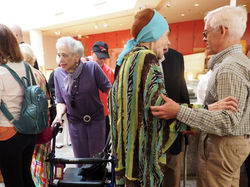 |
|---|---|---|
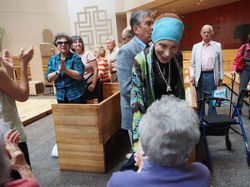 |  | 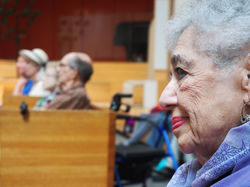 |
 |  |  |
 |
In the late fall, Cyrille’s health takes a turn for the worse.
She has pneumonia, her oxygen levels are low, her hip causes her more pain than usual and her heart is failing. She spends a week at Mt. Sinai Hospital and then three weeks at Mary Manning Walsh for rehab.
Every time she is in the hospital, Cyrille wonders if this will be the last time.
But on New Year’s Eve, almost a year after she first moved in, she arrived back to Carnegie East, weaker, but just in time for their grand dinner and live band.
She received an overwhelming greeting from everyone she saw in the elevator, hallway and dining room.
“That was just lovely,” she says.

In January, because of her frailty and the weather, Cyrille hasn’t left the building much.
Her family threw her an 85th birthday celebratory lunch for her (“Those children are so good to me.”). Otherwise, she only went outside to travel to doctor’s appointments.
With the new year, she has decided she is going to cancel her annual membership to the Y. It costs more money than she has, she is unable to go very often, her daughters worry about her being outside independently and it feels extravagant given the activities where she lives. She is sad to not see the people she has gotten to know there over many years and to miss the art classes, but she is accepting the decision.
While in the hospital, Cyrille’s artwork was on display as a part of an art show at Carnegie East.
Cyrille is eager to return to painting, after a month away while she was in the hospital. She said painting keeps her going because of the process, but also because it still allows her to dream.
“I’m always waiting to create that great artwork,” she said. “I still hold on to it.”
Since returning to Carnegie East, Cyrille now has a home attendant four hours every weekday to help her get dressed and help her get around. A visiting nurse comes weekly to check her vital signs and manage her bag full of medications (one pill is so large that Cyrille can’t swallow it).
Even on difficult days, Cyrille gets dressed, eats meals in the dining room, goes to classes and the evening movie. Having everything in one place seems more critical than ever.
Cyrille was recently asked to if she would like to be nominated to the board of the building’s residents’ committee. She is excited about the prospect.
“I feel honored,” she says.
And, shortly before going to the hospital, Cyrille says something changed in the dining room. She and a few others began to “make a fuss about it,” when people protected seats.
“You see your name on that chair? Then forget about it,” Cyrille said she started to answer back to people who held fast.
Hearing the conflict, Cyrille says the building’s staff got involved more often, supporting Cyrille and others’ right to sit anywhere.
“Once you’re in and lived here a while, you learn to do things their way because there’s no choice,” she said. “But there’s kind of a rule now. You can’t say, ‘that seat is taken.’”
